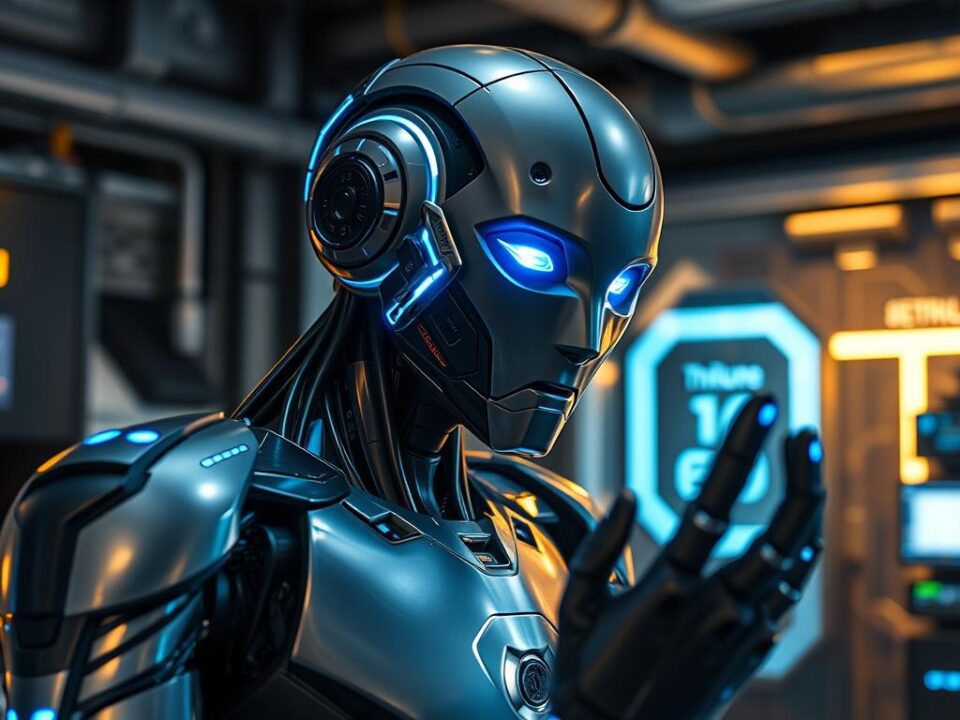Welcome to the world of artificial intelligence (AI) science. Here, research and discoveries are changing how we see the world. We’ll explore this exciting field with Dr. Nova, our virtual scientist.
Dr. Nova is a top-notch AI model for research in biology, immunology, and nanomedicine. It can translate texts, analyze big datasets, and mix complex information. This makes research easier, leading to deeper insights and clearer findings.
If you’re into AI research or just starting out, this guide is for you. With Dr. Nova, we’ll cover important topics, research areas, and ethics in AI science.
Introduction to AI Science
AI science is a growing field that focuses on making smart machines. These machines can do tasks that humans usually do. It uses machine learning and neural networks to analyze data and solve problems.
At its heart, AI science aims to create systems that learn and adapt like our brains. Machine learning is key here. It teaches computers to make smart choices based on data. This technology is used in many areas, from cars that drive themselves to understanding speech and language.
The field of AI scientist guide and science AI has changed how we tackle tough problems. It uses data to drive new ideas in many fields. As data gets bigger and more complex, the need for AI experts grows. This shows how vital AI is for finding new scientific and technological breakthroughs.
“AI is not meant to replace humans, but to enhance our capabilities by mimicking human behavior and decision-making processes.”
AI helps in many ways, like predicting diseases, improving supply chains, and creating smart helpers. The mix of AI, machine learning, and data science is key to solving big challenges. As AI science grows, so do the chances for major discoveries and improvements in our lives.
AI science offers many chances for those interested in tech, data, and intelligence. As we explore this field, we see how AI can make us better and help science advance.
Key Concepts in AI
Artificial Intelligence (AI) is a field that’s growing fast. It excites scientists, tech experts, and the public. The AI scientist guide looks at the main ideas that make AI work. These ideas help us understand how AI is changing the world.
Machine learning is a key part of AI. It lets systems learn from data on their own. This is different from old ways of programming, where rules were set beforehand. Machine learning helps AI systems recognize images, understand language, and predict things.
Neural networks are another important idea in AI. They’re like the human brain, with nodes that process information. This lets AI systems see complex patterns and respond like humans. Deep learning, which uses many layers of neural networks, has made AI even better at solving hard tasks.
AI can be narrow or general. Narrow AI, or weak AI, does specific tasks like playing chess or understanding speech. General AI, or strong AI, wants to solve problems and reason like humans, across many areas.
The AI scientist guide shows how AI has grown a lot over time. From solving simple problems to using machine learning and deep learning, AI has gotten much better. Now, AI is changing many areas of life and work.
“The future of artificial intelligence is not a race against the machines, but a race to create them.” – Musk, CEO, Neuralink
The Role of an AI Scientist
AI scientists are key in shaping AI’s future. They develop algorithms, analyze data, and create new AI models. Their work leads to big tech advancements, pushing AI science forward.
To be great at this job, you need to know how to program well. You also need to understand statistics and machine learning. Every day, they write code, prepare data, train models, and interpret results. They work with many teams, bringing new ideas to AI.
- Develop algorithms to solve complex problems
- Analyze large and diverse datasets to uncover insights
- Create AI models that can learn and adapt to new information
- Leverage machine learning techniques to drive innovation
- Collaborate with cross-functional teams to bring AI solutions to life
Being an AI scientist is both tough and rewarding. They can change many industries, like healthcare and finance. As AI needs grow, these experts lead the science AI revolution, shaping our tech future.
“AI scientists are the architects of the digital future, designing the systems that will transform how we live, work, and interact with the world.”
Tools and Technologies Used in AI
The field of AI science is growing fast. AI scientists now have many tools and technologies to help them. These include programming languages, AI frameworks, and libraries. They are key to the AI scientist’s work.
Python is a top choice for AI scientists. It’s easy to use, flexible, and has many AI libraries. Other languages like R and Julia are also popular. Each has its own strengths for AI work.
- Python: A popular and versatile programming language with a robust ecosystem of AI-focused libraries and frameworks.
- R: A statistical programming language widely used in data analysis and machine learning applications.
- Julia: A high-performance programming language designed for scientific and numerical computing, including AI and machine learning tasks.
AI scientists also use frameworks like TensorFlow, PyTorch, and scikit-learn. These tools help with model development, training, and deployment. They make AI work more efficient.
“The proliferation of free and open-source AI tools has democratized access to cutting-edge technologies, empowering AI scientists to explore new frontiers with greater ease and efficiency.” – Dr. Alice Johnson, AI Research Scientist
The AI scientist’s toolkit keeps getting better. New tools and technologies are always coming out. By using these resources, AI scientists can innovate and push AI forward.
Research Areas in AI
AI covers a wide range of research areas. Each one helps advance science and technology. From natural language processing (NLP) to computer vision and robotics, AI scientists are exploring new frontiers.
NLP makes it easier for humans and computers to talk to each other. It has led to big improvements in language translation, text summarization, and virtual assistants. These assistants can now understand and respond to voice commands.
Computer vision lets machines understand and analyze pictures and videos. This has led to new technologies like facial recognition, object detection, and self-driving cars.
In robotics and automation, AI is used to make physical systems more efficient. AI robots are changing industries like manufacturing and healthcare. They make tasks easier and help reduce mistakes.
“AI is not just a technology, but a tool that can augment and empower human intelligence. The key is to leverage it responsibly and ethically, ensuring it benefits humanity as a whole.”
These are just a few areas where AI research is happening. As AI science and the guide for AI scientists grow, we can expect even more exciting breakthroughs.
Ethical Considerations in AI
As AI science grows, we must think about its ethical sides. AI experts need to make sure their work is fair, open, and accountable. This is key for the good of society.
There’s a big worry about AI bias. For example, facial recognition might not work well for everyone. This could lead to unfair treatment. The White House has put $140 million into studying and fixing these issues.
AI could also change jobs a lot. As AI gets better, some jobs might disappear. Experts are working on training programs to help workers adapt. AI scientists must team up with policymakers to tackle these big problems.
There are also questions about who owns AI art and who’s responsible for AI cars. Research in explainable AI is trying to make AI more transparent and fair. This is important in areas like healthcare and driving.
Creating AI ethically means looking at all sides of the issue. AI experts need to work with ethicists, lawyers, and policy makers. This way, AI can help us without causing harm.
“The development of full artificial intelligence could spell the end of the human race… It would take off on its own, and re-design itself at an ever-increasing rate. Humans, who are limited by slow biological evolution, couldn’t compete, and would be superseded.”
Collaboration in AI Research
The field of AI science thrives on collaboration. AI scientists and researchers work together to explore new possibilities. They combine skills from computer science, mathematics, and other areas to speed up AI development and use.
Recent studies show AI’s power in improving scientific teamwork. At the OIS Research Conference in 2022, scholars used AI to help with research ideas for a grant. The results showed AI’s value in sharing knowledge and teaming up with experts from other fields. Yet, the study noted AI can change how we work together, posing challenges for researchers.
To tackle these issues, AI scientists are looking into open research methods. They focus on open access, data sharing, and teaming up across disciplines. These strategies aim to make science more efficient and productive. As AI advances, teamwork among virtual scientists and AI experts will become even more crucial.
“Collaboration is essential in AI research, as it allows us to leverage diverse perspectives and expertise to solve complex problems. By working together, we can accelerate the development and application of transformative AI technologies.”
– Dr. Emily Novak, leading AI scientist and research director at the Institute for Intelligent Systems
Career Paths for AI Scientists
AI scientists have many career paths to choose from. They can dive into research, create new AI solutions for businesses, or focus on AI ethics. The field is full of exciting opportunities.
In academia, AI scientists can research and teach. They work with teams, publish studies, and mentor others. In industry, they help develop and use AI in various sectors, like finance and healthcare.
Freelancing and consulting offer flexibility and autonomy. AI scientists work on different projects across industries. They use their skills to solve complex problems and help businesses grow with AI.
AI scientists must keep up with AI’s fast changes. They need to know the latest trends, tools, and ethics. By doing so, they can help shape the future and make a difference.
“The future of AI is in the hands of those who are passionate about its potential and committed to using it responsibly.” – Dr. Samantha Novak, Chief AI Scientist
- Pursue a degree in artificial intelligence or a related field to build a strong foundation.
- Gain practical experience through internships, research projects, or entry-level positions.
- Stay up-to-date with the latest advancements in AI by attending conferences, workshops, and online courses.
- Develop a diverse skillset, including programming, data analysis, and machine learning, to enhance your versatility.
- Network with other AI professionals, join industry associations, and contribute to the broader AI community.
- Consider specializing in a particular domain, such as healthcare, finance, or robotics, to differentiate your expertise.
- Demonstrate a strong ethical compass and a commitment to the responsible development of AI technologies.
By embracing AI’s dynamic nature and staying true to their passions, AI scientists can have fulfilling careers. They shape the future of technology and benefit society.
How to Get Started in AI Science
Starting your journey in AI science is exciting. You can get a degree in computer science, mathematics, or related fields. These subjects give you the basics and problem-solving skills needed for AI.
There are also many online resources for learning on your own. You can find Massive Open Online Courses (MOOCs), interactive tutorials, and coding platforms. These help you learn the core ideas and how to apply them in AI.
- Learn programming languages like Python and C/C++ which are key in AI and machine learning.
- Get to know data management tools like Apache Cassandra and DynamoDB. They’re important for handling big data in AI research.
- Check out AI platforms like Microsoft Azure AI and Google Cloud AI. They offer hands-on experience with the latest tools.
As a future AI scientist, keep up with new developments in AI. Join online forums, go to industry events, and work with others. This helps you learn more and meet experts in the field.
“The future of AI is not about building a conscious machine, but rather about creating intelligent systems that can help us solve complex problems and improve our lives.” – Dr. Fei-Fei Li, Co-Director of the Stanford Institute for Human-Centered Artificial Intelligence
By diving into the world of virtual scientist and AI, you’re on your way to exploring its vast possibilities. You’ll help advance science and society.
Future Trends in AI Science
The field of science AI is growing fast, with new trends on the horizon. Quantum AI and AI in healthcare and climate research are leading the way. These advancements promise to change AI science for the better in the coming years.
Quantum AI is getting a lot of attention. It uses quantum mechanics to boost computing power. This could lead to big breakthroughs in drug discovery and climate modeling.
Edge AI is another trend. It moves AI processing closer to data sources. This makes real-time decisions easier, especially in fields like autonomous vehicles and smart cities.
Explainable AI (XAI) is also important. It makes AI models easier to understand. This is key for building trust in AI, especially in critical decision-making areas.
AI scientists will soon focus on general AI. These systems can learn and adapt across many tasks. This could lead to major advancements in natural language processing and computer vision.
The role of AI scientists will keep changing. They’ll need diverse skills and a deep understanding of ethics. As science AI and AI scientist guide grow, teamwork will be crucial. It will help ensure these technologies are used responsibly and for the greater good.
“The future of AI is not about machines taking over the world, but about humans and AI working together to solve the world’s greatest challenges.”
Conclusion: Embracing the AI Revolution
The AI revolution is changing how we do science and work in many fields. It brings new ways to solve big problems and learn more. As AI grows, we must use it wisely and with care.
New jobs in AI, data science, and machine learning are popping up. This means more people are needed for these roles.
Companies are now teaching their workers about AI and machine learning. They also focus on skills like thinking critically and understanding emotions. This helps in making better decisions faster, especially in finance, healthcare, and marketing.
The future of work will see more teamwork between humans and AI. AI will help humans in creative fields like design and marketing. But, we must also think about the ethics of AI, like keeping data safe and avoiding bias.
This means we need rules and guidelines for using AI the right way. This ensures AI is used for good and not harm.







